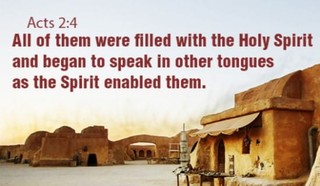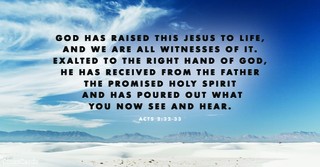
- Recent Translations
- All Translations
Acts 2:27
Share
Settings
Acts 2:27 Meaning and Commentary
Because thou wilt not leave my soul in hell
This is an apostrophe, or an address to his Father, who he believed would not leave his soul, as separate from his body, in Hades, in the invisible world of souls, in the place where the souls of departed saints are, but would quickly return it to its body, and reunite them; or else, that he would not leave his dead body, for so (vpn) sometimes signifies; see ( Leviticus 19:28 ) ( 21:1 ) ( Numbers 9:10 ) ( Numbers 19:11 Numbers 19:13 ) in the grave; which is no unusual sense of (lwav) ; see ( Genesis 42:38 ) ( Isaiah 38:18 ) that is, so long as to be corrupted and putrefy, as the next clause shows:
neither wilt thou suffer thine Holy One to see corruption.
The character of an "Holy One" well agrees with Christ, both as God, or with respect to his divine nature, holiness being a perfection in it, and in which he is glorious; and as man, he being holy in his nature, harmless in his life and conversation: all his doctrines were pure and holy, and so were all his works; and all his administrations in the discharge of every of his office; and he is the efficient cause and lain of all the holiness of his people; they are sanctified in him, and by him, and have all their sanctification from him. The word may be rendered, "thy merciful", or "bountiful one"; and such Christ is, a merciful, as well as faithful high priest; and who has shown great compassion both to the bodies and souls of men, and has been very beneficent and liberal in the distributions of his grace and goodness. Now, though he died, and was laid in the grave, and buried, yet God would not suffer him to lie there so long as to be corrupted and putrefied, which is the sense of seeing corruption: and so the Jews themselves explain the last clause of the preceding verse, in connection with this, "my flesh shall rest in hope", that no worm or maggot should have power over it, or corrupt it.
``Seven fathers (they say F24) dwell in eternal glory, and there is no (helwtw hmr) , "worm or maggot", rules over them; and these are they, Abraham, Isaac, and Jacob, and Moses, and Aaron, and Amram their father; and there are that say also David, as it is said, ( Psalms 16:1-11 ) , "therefore my heart is glad, and my glory rejoiceth, my flesh also shall rest in hope".''And which sense also is mentioned by one of their commentators of note F25, who thus paraphrases the words:
``whilst I am alive it shall rest safely, for thou wilt deliver me from all hurt; and in the mystical sense, or according to the Midrash, after death; intimating, that no maggot or worm should have power over him;''which was not true of David, but is of the Messiah.
F24 Massecheth Derech Eretz Zuta, c. 1. fol. 19. 1.
F25 Kimchi in Psal. xvi. 9.
